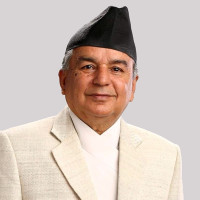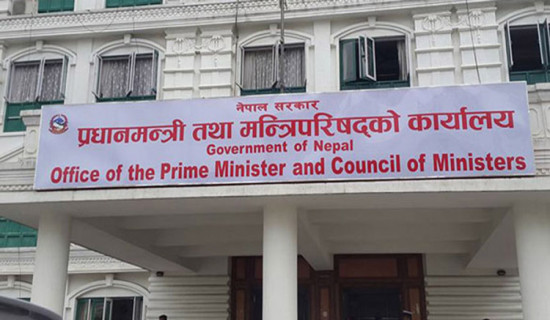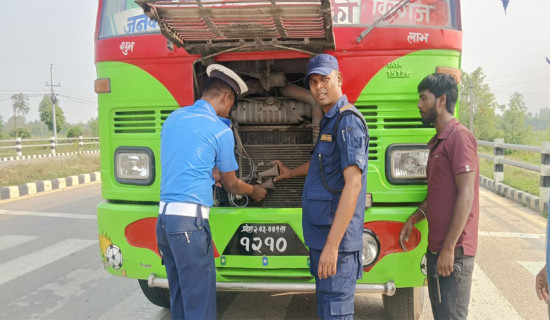- Sunday, 19 May 2024
Gorkhapatra Living Heritage Of Nepali Journalism
"And thus I clothe my naked villany, … And seem a saint, when most I play the devil”: William Shakespeare writes in Richard III. Sometimes bad rulers also come up with some good jobs to cover up their wickedness. In the history of Nepal, Jung Bahadur Rana is remembered for his evil mind of orchestrating ‘Kot Parva’ in which hundreds of patriots and alike were killed in the royal court and Jung Bahadur Rana took over power . ‘Kot Parva’ marked the beginning of the Rana family oligarchy which remained as notorious regime for over a century in Nepal.
After taking over power, Jung Bahadur Rana visited England in 1850 and brought with him a printing press known as ‘Giddhe Press’ from London. It was called ‘Giddhe Press’ because it had the emblem of an eagle. This marked the beginning of printing press in Nepal more than 400 years after Gutenberg invented printing press in Europe. Dev Sumsher Rana assumed the office of ‘ Shree Tin’ and Prime Minister in 1901. Dev Sumsher was slightly of liberal nature and he tried to initiate some reform-looking tasks. He started the publication of Gorkhapatra. The liberal attitude and reforms he initiated caused his ouster from power. He was alleged by other Rana courtiers that his reforms and liberal attitude would ultimately prove disastrous and cause the end of the rule of the Rana clan that was established by Jung Bahadur. Thus, his own brothers staged a coup and ousted him from power and his younger brother Chadra Sumsher took over power. Dev Sumsher had to pay the price for his liberal attitudes and acts including the publication of Gorkhapatra.
Gorkhapatra Daily has completed its 123 years and entered 124th year. Its publication has been uninterrupted. Gorkhapatra is the only newspaper that has been in operation since its first publication. Some scholars even claim that the Gorkhapatra was first published ten years earlier. But it was not given continuity nor that edition is available anywhere. Journalist Shreeram Singh Basnet in his book ‘Dimension of Journalism’ says ‘Gorkhapatra was first published ten years earlier. But it discontinued after its first edition. Scholar late Shiva Regmi, who conducted several researches on media and journalism in Nepal, once told this author that British Prince (who later ascended to British throne) Edward VII was to visit Nepal for hunting purpose in Terai. Rana authorities had heard that the British royals had the habit of reading newspapers with their breakfast. So Bir Sumsher Rana, the then ruler, arranged the publication of one edition of Gorkhapatra to show to the British royals that Nepal also had newspaper. But the British prince returned from Terai and the Gorkhapatra publication was not given continuity.
Gorkhapatra is not only a newspaper but a living heritage of Nepal’s media history. In a way, Gorkhapatra is Nepal’s journalism university that has practically trained many journalists. Many senior journalists of Nepal have, in a way or the other, some kind of association or affiliation with the Gorkhapatra daily and its sister publications or its management.
Gorkhapatra Corporation now publishes Gorkhapatra daily in Nepali language, The Rising Nepal daily in English, Madhuparka liternary magazine, Muna magazine for children and Yuva Manch , a youth magazine. Apart from that, Gorkhapatra Corporation, being the state-owned entity, has taken the responsibility of promoting various languages spoken in the country. Cognizant of its social responsibility, it has been regularly publishing special editions in different languages spoken in Nepal, which is an effort to promote all languages of Nepal. Gorkhapatra is thus the proud history of Nepali journalism.
My journey as a journalist with The Rising Nepal started in 1988 and continued till 2016. I had the hobby of reading right from the childhood. When I grew I got more interested in news and events at home and abroad. I used to regularly rush to Bhugol Park in New Road every morning to read Gorkhapatra. There were days when Gorkhapatra used to be pasted on the wall of Bhugol Park every morning. This was how I got attracted to the Gorkhapatra and The Rising Nepal. As reading was my hobby and passion, so was the writing. I used to make notes of what I read. On advice of one of my teachers, I started writing. He told me: ‘Reading makes a full man, writing makes an accurate man and discussion makes a perfect man’. Thus, I started writing in English and I sent some of them to The Rising Nepal.
My professional entry into The Rising Nepal was also a coincidence. One day when I was in the editorial office of The Rising Nepal to submit my article, a senior editor asked me if I was interested to join the paper. He even advised me to immediately apply as the deadline for applying is closing. I accordingly applied and attended the written examination and interview. I was finally selected as one the sub-editors. That is how my career began in The Rising Nepal.
The entry into The Rising Nepal was a turning point in my life. In my early years with The Rising Nepal were both challenging and also full of excitement. The atmosphere in The Rising Nepal was very friendly. Shyam Bahadur KC was the editor in chief when I joined. He always encouraged everyone and he never behaved as a boss but as a colleague. I have great respect for him and he will always remain in my heart as a man of high self-esteem. I am highly indebted to him and other senior colleagues like Ratna Kaji Tuladhar, P. Kharel, Gopal Sharma, Jawahar Krishna Manandhar, Lok Deep Thapa, Gyan Bahadur Rai and many others who were very cooperative. I honed my skill under their guidance and supervision.
Gorkhapatra has travelled and traversed many ups and down. It has seen Rana family oligarchy, Panchayat and King’s absolute rule, multi-party democracy under constitutional monarchy and now democratic republic. Time has changed and so is the context. The Gorkhapatra, too, has to change itself in commensurate with the changed context.
(The author is former chief editor of this daily.)
















